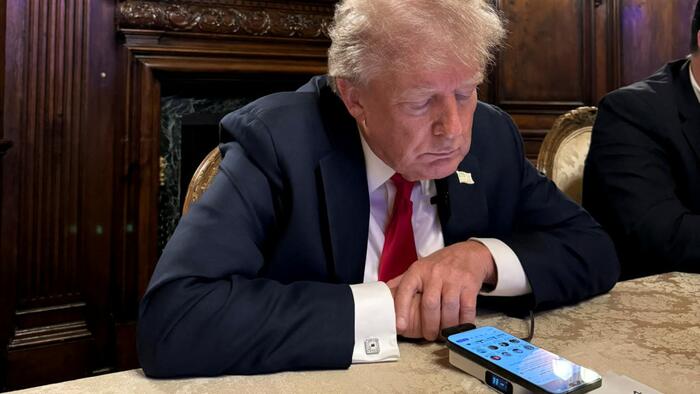In his analysis, Russell Clark reflects on the implications of potential political shifts in the United States, specifically with regard to economic policy, international relations, and the dynamics of power both domestically and globally. With the 30-year US Treasury yield climbing back to 4.6%, Clark argues that the anticipated decline of the US deficit seems increasingly unlikely, regardless of who occupies the White House. He questions the bullish sentiment surrounding TLT, the long-term Treasury ETF, suggesting that the market’s ongoing optimism may be misplaced as demand should realistically diminish in light of these economic realities. Citing a potential Republican sweep with Trump’s reelection, Clark emphasizes that an ‘America First’ doctrine appears to be solidifying the U.S.’s shift away from collaborative trade relations towards a more solitary and protectionist outlook.
Clark posits that the evolution of U.S. political behavior mimics business practices where leverage and power overshadow established rules. He highlights that countries with independent military capabilities such as Russia, China, and possibly India remain the only ones capable of negotiating effectively with the U.S., rendering nations like Australia, Japan, and the UK more akin to vassal states. This shift signifies a regression to a Great Power political landscape, where trust and diplomacy are overshadowed by military considerations and national self-interest. The implications of a Trump victory could manifest in the rise of authoritarian leaders globally and a renewed focus on military buildup across various nations, consequently altering the post-World War II order that favored free trade and cooperation.
The potential repercussions of such a geopolitical realignment are particularly concerning for nations that have depended on the U.S. as a stable partner in free trade and democratic principles. Clark notes that Europe, which had demilitarized to prioritize peace, may be compelled to remilitarize, creating tensions regarding how this can be achieved without reigniting conflict. Meanwhile, Japan faces economic stagnation and declining wages as its reliance on U.S. Treasury purchases, which were initially seen as a wise investment strategy, now appears increasingly outdated. The erosion of Japan’s relative wealth becomes evident in the declining price of gold in yen terms, highlighting the shrinking influence and vulnerability of nations that once thrived under U.S. leadership.
Reflecting on the trajectory of U.S. foreign policy, Clark posits that the approach of fostering growth through trade to export democracy has faltered, particularly as rivals emerge stronger due to shifts in the global landscape. The “America First” ethos emphasizes a sentiment that others must fail if the U.S. is to maintain its dominance. This protectionist stance could lead to a re-envisioning of economic frameworks that prioritize an insular approach, moving away from established practices favoring collective prosperity. The historical context of America’s economic ascendance rooted in rival destruction also serves to illustrate a willingness to embrace a unilateral path forward, echoing sentiments of exceptionalism that could hinder collaborative international endeavors.
On a broader technological frontier, Clark connects these political changes to a burgeoning digital world increasingly dominated by American corporations. The power dynamics between multinational corporations and nations manifest a challenge for governments to enforce regulations, especially if tax policies shift further in favor of these entities, further blurring lines between state authority and corporate influence. Notably, figures like Elon Musk symbolize the convergence of business and political power, potentially reshaping the nature of international relations. The usage of decentralized technologies like Bitcoin, which operates beyond governmental control, signifies a pivot towards a new socioeconomic order that could diminish traditional notions of national sovereignty.
In terms of immediate market strategies, Clark predicts that investors may favor a combination of long positions in the S&P 500 and Bitcoin while shorting Treasuries. While these tactical plays might appear advantageous for the short term, the long-term scenario he envisions includes a global political landscape steeped in volatility where traditional democratic principles are undermined. The predicted rise of generalist politicians over legal mentors suggests a fundamental shift in governance, one that increasingly favors populist rhetoric amidst an environment hostile to the established norms of analysis and diplomacy. Clark’s contemplation presents a formidable outlook on the intersections of politics, economic power, and global relations, suggesting that if this trajectory continues, we may be witnessing a significant evolution—or regression—of governance structuring within the global order.

